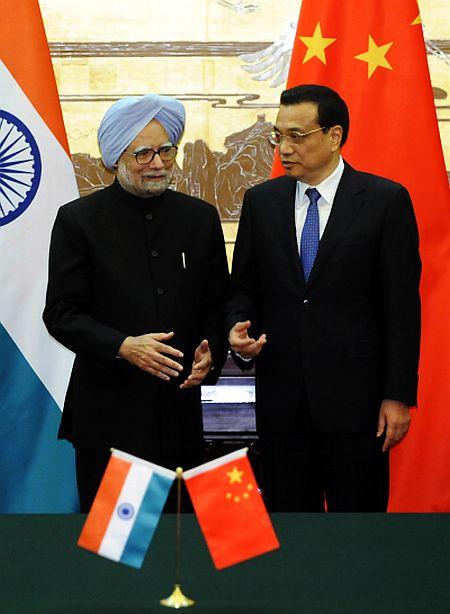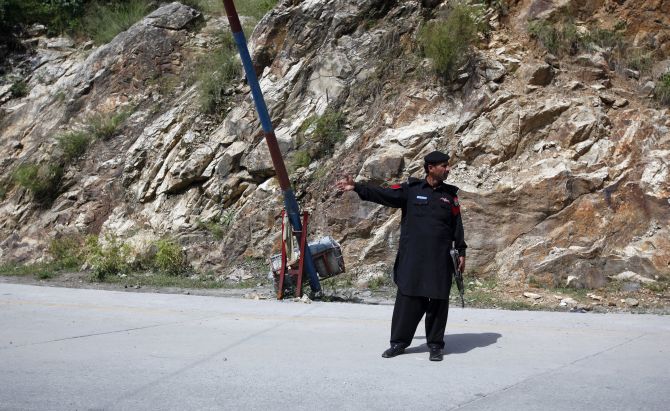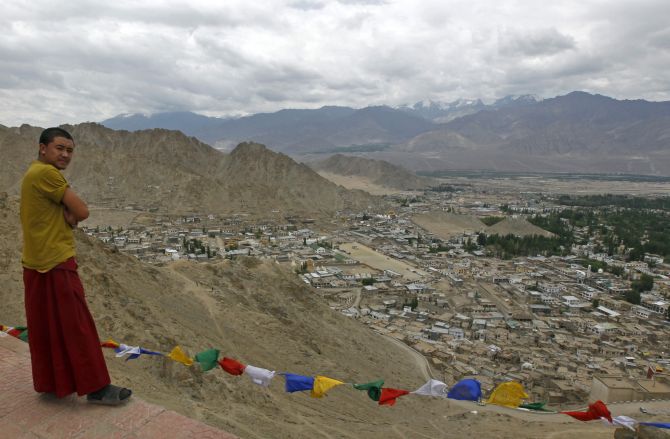
It is entirely understandable and eminently sensible that we do not fall in the American trap of joining an anti-China front. But for this to succeed there has to be quid pro quo from the Chinese. If there is indeed some in the border deal that the two nations signed, it is not in public domain, says Colonel (retd) Anil Athale.
The Indian prime minister visited China for three days from October 22 to October 24. He was not alone in town as his visit coincided (‘accidently’ according to the official Chinese media) with the visit of the Russian and Mongolian heads of the governments.
Embedded Indian media personnel, as is the norm, hailed the visit as ‘historic’ and path breaking et al. This has become the usual practice now and one does not recall a single ‘not so successful’ visit. The visit took place at a particularly inappropriate moment.
The Indian rupee had just about recovered from a fall, the Indian economic ‘miracle’ seems a distant dream and irrespective of which party wins the May 2014 elections in India, the current PM is certainly not going to be in chair after that. The PM was further weakened a little time ago by his own party vice president when he had to eat crow on a measure to save tainted politicians.
However, it must be accepted that in the nine-year ‘diarchy’ foreign affairs were left to the PM while the UPA chairperson Sonia Gandhi controlled other policies.
Colonel (retd) Anil Athale is coordinator of the Pune-based INPAD and co-author of official history of the 1962 Sino-Indian border conflict.
Please …

Even before the PM could take off on his visit to Russia and China, the Chinese signalled their intent by making public its intent to sell 1,100 MW nuclear reactor to Pakistan flouting the Nuclear Suppliers Group norms. This would enable the Pakistanis to boost their own fast growing nuclear arsenal, an arsenal that is India centric.
In case any Indian missed the snub, the Chinese further rubbed Indian nose in dirt by issuing a ‘stapled visa’ (as opposed to normal visa stamped on the passport) to two young archers from Arunachal Pradesh. The two poor girls had to cancel their participation in world championship being held in China.
This has been a Chinese policy to keep alive its claim to the entire Indian state of Arunachal Pradesh that Chinese insist on calling it ‘southern Tibet’ and part of China.
The highlight of the visit was the Border Defence Co-operation Agreement signed by the two PMs on October 23. The immediate background to this was the recent confrontation between two sides in the Aksai Chin area. There is the usual ‘diplomatese’ verbiage about shared interest’s et al. But the crucial points of the agreement are as follows,
Please …

Prima facie there is very little that one can object to in this agreement. But as the saying goes, the devil is in the details! The provisions to avoid clashes between the two sides along the Line of Actual Control are unexceptionable. But given the superior Chinese infrastructure in Ladakh border areas (where the LAC is), it actually gives an advantage to the Chinese.
But the most worrying aspect of this agreement is that India has accepted that it will not seek to build up ‘unilateral superiority’. Does this interpretation mean that the troop levels will remain frozen? What happens to the new offensive formation being raised by India in the East? Since China is far ahead in infrastructure build up will Indian efforts of matching China in road building et al be construed as seeking unilateral superiority? One hopes that through this we have not given the Chinese a ‘veto’ over our future road development and additional troop deployment.
But it is the larger picture that is frightening to say the least. Incidentally, these confidence building measures are not very different from what we have with Pakistan along the LoC. We all know the result of those CBMs. But it seems China has decided that it wants peace on its Western borders while it deals with far more problematic disputes of its maritime border with Japan, Vietnam and the Philippines.
Please …

It is not known what assurances were sought and given by the Chinese in regard to its nexus with Pakistan and frequent reports of presence of its troops in Gilgit, Hunza and Skardu areas of Pak occupied Kashmir.
Having studied the Sino-Indian conflict of 1962 in depth, this author was of the firm view that Aksai Chin held no strategic value for India in 1962 as a jump off point to drive a wedge between Chinese restive province of Sinkiang and its occupied Tibet. Even for defence of Ladakh, it was far too forward and India would be better placed to defend Leh with defences based on the Ladakh and the Karakoram range.
But that was when China-Pakistan military nexus did not exist. Today with the building of Karakoram highway and frequent access to the Chinese army and even more crucially to its air force to lower altitude airfields in Pakistan occupied Kashmir, the strategic situation has changed drastically for us.
Today China and Pakistan combined are capable of mounting a threat to Ladakh from east as well as north.
Please …

With the retreat of American power from Afghanistan, the restraining influence of the US on Pakistan is also likely to evaporate. With changes in technology and build up of Manali Leh axis (10 years too late) we should be in a position to thwart this combined design. Aksai Chin is crucial for this purpose and so is the Siachin glacier (where peaceniks periodically mount attacks to give it up). Instead of a robust military response to the Depasang intrusion of this year we seem to have opted to accept status quo. The status quo includes,
But the whole India China agreement issue raises even more disturbing questions on Indian decision making process. Was this agreement a result of consultations with the armed forces as well as principal opposition? Or was it a ‘unilateral’ effort of the national security advisor and the foreign ministry.
It is entirely understandable and eminently sensible that we do not fall in the American trap of joining an anti-China front. But for this to succeed there has to be quid pro quo from the Chinese. If there is indeed some, it is not in public domain.
In future when China will raise objections to our road development in Ladakh in Demchok area or induction of an additional division in Ladakh, quoting this agreement history will know whom to blame.
...